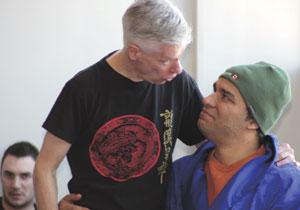Secrets can tear a family apart or hold it together. And, sometimes, they can do both.
That’s the concept behind Other Eyes — a new play by Richard Marquis, which will soon debut at Arts Court Theatre as part of TotoToo’s local playwrights’ series.
TotoToo has gone in a whole new direction in its fifth year, with three new, homegrown plays by Ottawa playwrights: A Fateful Meeting of les Femmes Fatales, by Mary Harvey (August 2011); Other Eyes (April 2012); and His Grace, by Daniel Drolet (May 2012).
“It’s not really a question of trying to get Ottawa on the map,” says TotoToo founder David Ferguson. “It’s [about] trying to get the gay community engaged in theatre. These are three gay playwrights who need a place to expose their art, and here’s our opportunity. I think it’s more important to bring gays and lesbians together in a theatrical environment than anything else.”
That process includes offering up professional opportunities to community members and supporting them in achieving their theatrical dreams and goals. When it comes to Other Eyes, Richard Marquis is having a script produced for the first time, a handful of new actors are involved in the show and Seamus McKenzie-Chapman is making his directorial debut.
“It’s a complex storyline. It really is,” says Caroline Bowden, who plays the character Ruth. “It’s a play about discoveries — people discover things about themselves and about other people. The audience is constantly discovering things. If you like jigsaws and join-the-dots, you’re going to like the play.”
Other Eyes opens with a scene at a college in the early ’60s, where we meet three of the main characters: Wil, Jake and Claire. Wil is gay, Jake is bi, Claire is straight — and hopelessly in love with Wil. As the play goes on, we begin to wonder if perhaps she’s not the only one.
“The three of them, as friends, recognize that there’s something that binds them together,” says Michael Wright, who plays Jake. “Jake makes the decision to marry Claire so that, in a sense, she’s taken care of. Wil says to him, ‘Do you promise you’ll take care of her, and love her?’”
The plot centres on that 40-year arrangement and its dissolution, which happens when Claire dies.
“Other Eyes is about accepting and tearing down the preconceptions that one may have,” McKenzie-Chapman says. “There are a lot of lies and deceptions. In that sense, it has a soap opera-ish feel.”
Amidst the drama of all these challenges and revelations, there is a deeper theme.
“The play is about aging and age in the gay community,” says Marquis, a retired businessman and first-time playwright. “There are children and grandchildren involved, so you get to see the different attitudes towards gay people from the perspective of the teenager, the middle-ager and the elderly. It’s a very interesting take on aging and the development of a gay consciousness over the last 40 or 50 years.”
The issue of aging is not typically at the heart of gay storylines. But, with the mainstream success of recent movies like Beginners, featuring Christopher Plummer’s moving depiction of a man in his 70s who comes out after his wife dies, perhaps there’s more room for us to reflect on stories like Wil, Claire and Jake’s.
“What I think is interesting about the play is these complex arrangements that support some of the secrets and the rough-around-the-edges aspects of the characters’ lives,” Wright says. “Family has always been a complex matter. These are the people that you come into the world knowing and loving, and you find a way to work it out. It’s important for us to consider family, and family issues, as a community.”

 Why you can trust Xtra
Why you can trust Xtra


